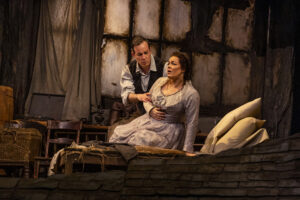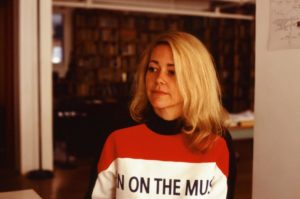
Metropolitan Opera 2022-23 Review: La Bohème
Yannick Nézet-Séguin Shines Alongside Solid Cast
By Jennifer Pyron(Credit: Curtis Brown)
On April 21, 2023, the Metropolitan Opera opened Puccini’s “La Bohème,” with libretto by Giuseppe Giacosa and Luigi Illica, based on the novel “Scènes de la Vie de Bohème” by Henri Murger.
While “Bohème” has been performed over 1,300 times at the Met, this particular production felt like a new dream come to life. The classic staging and story were refreshingly vibrant, as conducted for the first time by Met Opera’s music director Yannick Nézet-Séguin. Franco Zeffirelli’s timeless set design and production were made possible by a gift from C. Graham Berwind, III and the Metropolitan Opera Club. All together this production reimagined the good ol’ days of a most beloved bohemian score.
The synopsis of “La Bohème” captures a moment in time when the practice of an unconventional lifestyle meant a lot of different things. Bohemians were seen as outsiders of what was considered the norm, however this was not their most defining characteristic. As a movement, bohemians proactively challenged the bias of identity and lived as radical creative activists. They were not merely dreamers, instead, their choices led to expansive opportunities surrounding life, work, and the creative process apart from the limitations of societal expectations and cultural assimilation. And, while this was a movement back then, it continues to be a movement right now. Because, it always has been. I also think it was a very wise decision for the Met to bring back the bohemians and an even wiser decision to have Yannick Nézet-Séguin show us how it is done.
The singers of this production, however, in their own ways highlighted some questionable judgment calls around their personal interpretations.
Solid Cast
Act one takes place in 1830’s Paris at a Latin Quarter garret where artist Marcello and poet Rodolfo summon good spirits to celebrate Christmas Eve despite being impoverished. Baritone Davide Luciano (Marcello) and tenor Stephen Costello (Rodolfo) innocently bantered and carried-on while feeding the pages of Rodolfo’s latest drama to the stove fire. Davide Luciano’s portrayal of Marcello was lively and uncanny. He sang with precision, gusto and an underlying sense of keen self-deprecation that garnered a lighthearted painter, sometimes hard to find in these larger than life tenor roles. He absolutely enjoyed what he was singing, beginning with “Questo Mar Rosso,” and leaned into this pleasure trove of delight, as an over-the-top “starving artist.” There was also a feeling of confidence that Luciano eluded but never fully revealed, that made him charming but not overtly so. The audience was either smiling or openly laughing whenever he was present. Luciano continued to carry the bulk of this opera’s comic relief all throughout. Especially, in the iconic Act two scene when Musetta, Marcello’s former lover, teases and taunts him. Luciano stood out, in a good way.
Tenor Stephen Costello as Rodolfo made for an interesting combination of vocal dynamic choices and an excessive need to overact. I believe that Costello had his own best intentions at heart, but it was difficult for me to watch his interactions, even with Mimì, because everything he did brought all the attention toward him, even when it wasn’t called for. During the death of Mimì, he raised his head in sorrowful remorse that felt unnecessary and out of touch with the already emotional music. He grabbed Mimì’s head and held her face into his chest during “Sono andati,” which also prevented her from singing and created a disconnect between the two. Stephen Costello’s voice was sometimes aligned and sometimes not, as heard from his opening aria, “Che gelida manina,” and through his last. Maybe he was having an off night, but I was confused for the majority of his performance about what his focus was and why the music alone was not sufficient enough for him to create more of a genuine connection with his colleagues.
Eleonora Buratto sang the role of Mimì with grace and emotional intelligence. Despite being very piano in “Mi chiamano Mimì,” Buratto’s voice was centered and extraordinarily clear. Her high range sparkled like a silver thread of sound that cut through the vivacious orchestra playing. “O soave fanciulla” was tricky because, again, Costello’s dynamic was uncertain and so it felt like Buratto wanted to meet him in the middle. All throughout, however, Buratto’s performance was grounded. Her natural and gifted soprano deserved to be heard. “Donde lieta uscì” felt like a turning point, as she became more energized. Her final scenes while dying were, like I said before, interfered with by Costello. Buratto’s gentleness was overshadowed in the end, and one might have felt even more emotional than usual about this fact.
Sylvia D’Eramo’s Musetta was playful, carefree and joyous. D’Eramo’s voice during “Quando m’en vo’” was a bit more restrained than I am accustomed to, however it seemed that she was caught up in enjoying the scene altogether. Her smile and laughter was consistently contagious. She was stunning in her costume and really had fun in this role. There was also special chemistry between her and Marcello that amplified the lover’s quarrels and made for an entertaining experience. I thoroughly enjoyed D’Eramo’s nonchalant and cool perplexity that brilliantly revived this role for me. D’Eramo gave Musetta a glow up!
Other Stunning Performances
Christian Van Horn was a true highlight of this production in every way. His demeanor was strong yet vulnerable, especially during “Vecchia zimarra, senti,” where he reached into the depths of his own soul and presented an unforgettable moment in time. The entire audience was captivated by him. Van Horn was also considerate of his castmates and put others at ease as he portrayed the wise and loyal philosopher, Colline. His voice was an organic match for the entire performance. I also witnessed him being consistently in sync with Yannick Nézet-Séguin’s direction. There was a synthesis in the air that really made a positive difference.
Alexey Lavrov performed the role of Schaunard with an amiable and attentive awareness. Lavrov’s voice was pure and resonated with a youthful timbre. He kept up with the ongoing banter especially during “Si può.” Lavrov was an excellent choice for the role of a gifted musician. His Schaunard was exciting. Donald Maxwell’s Benoit was fittingly hilarious and adeptly understood. Maxwell’s acting skills were excellent. He was direct yet open to interacting with the moment that felt very natural. I remember forgetting I was watching an opera during his drunk and delirious depictions of an older landlord because I was enthralled with his performance. He also did an excellent portrayal of Alcindoro, Musetta’s wealthy admirer. Gregory Warren’s Parpignol was also a genuine portrayal. He was friendly, welcoming and fun.
Act two was an iconic masterpiece when the Met chorus sang and the streets of Paris were alive on stage. Yannick Nézet-Séguin conducted all with a smile of pure joy on his face. He was beaming with pride during Act two especially and this moment emotionally moved me to tears. Personally, I have never witnessed a conductor as grateful and enthusiastic as Nézet-Séguin. The Met has noticeably transformed due to his presence and ability to uplift the world through his musical interpretations.
What made “La Bohème” most enthralling was Nézet-Séguin’s tempo and dynamic choices. Act one was a range of playful and introspective musical moments that brought the orchestra forward to be more involved with what was happening on stage. For example, when Colline, Schaunard, Marcello and Rodolfo brought Benoit into their home, the music flourished with excitement and a certain rowdy quality that amplified the singing and joking remarks about rent payment, etc. Nézet-Séguin leaned into a lightheartedness that for me, “La Bohème” was made for. I also loved how the orchestra took its time to develop with the singers during intimate moments. “O soave fanciulla” glittered and glistened like a starry Paris night made for two lovers. Nézet-Séguin melted his body into the emotions of Puccini’s composition. He honored the core of “La Bohème” by letting the music speak for itself and breathe! He had us all on the edge of our seats. It was a joy to feel loved and held in this way, by someone who intuitively and intelligently understands the powerful ways of love.



